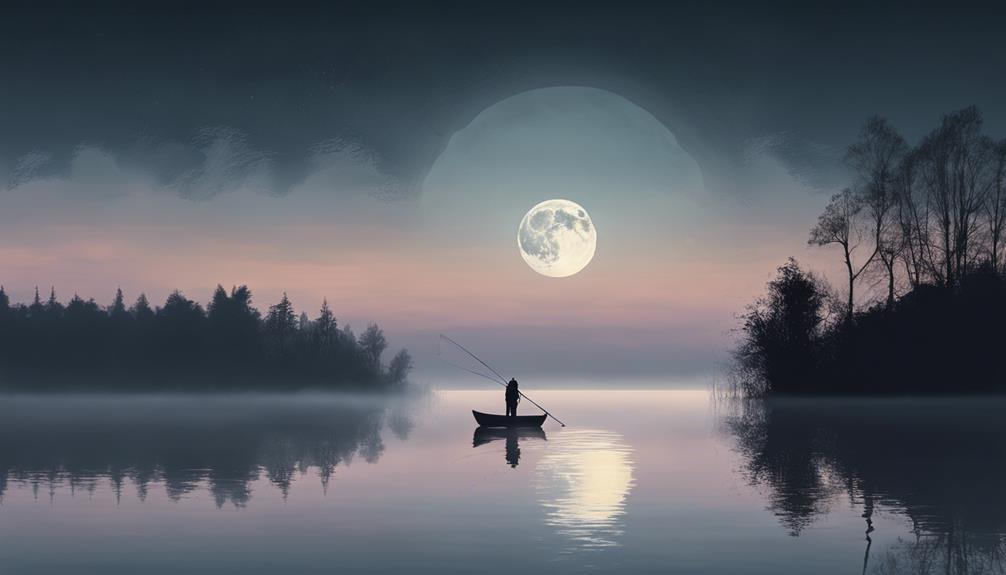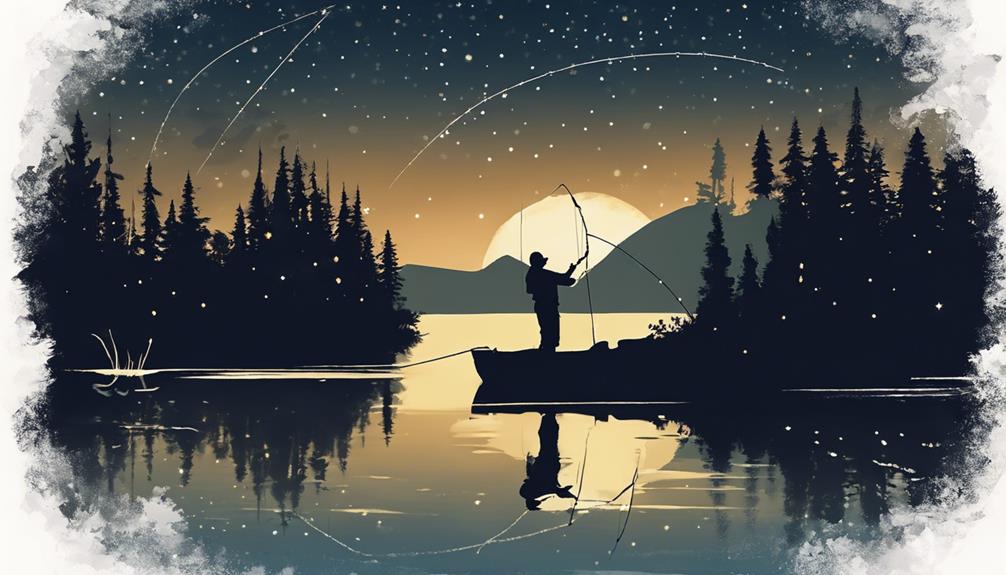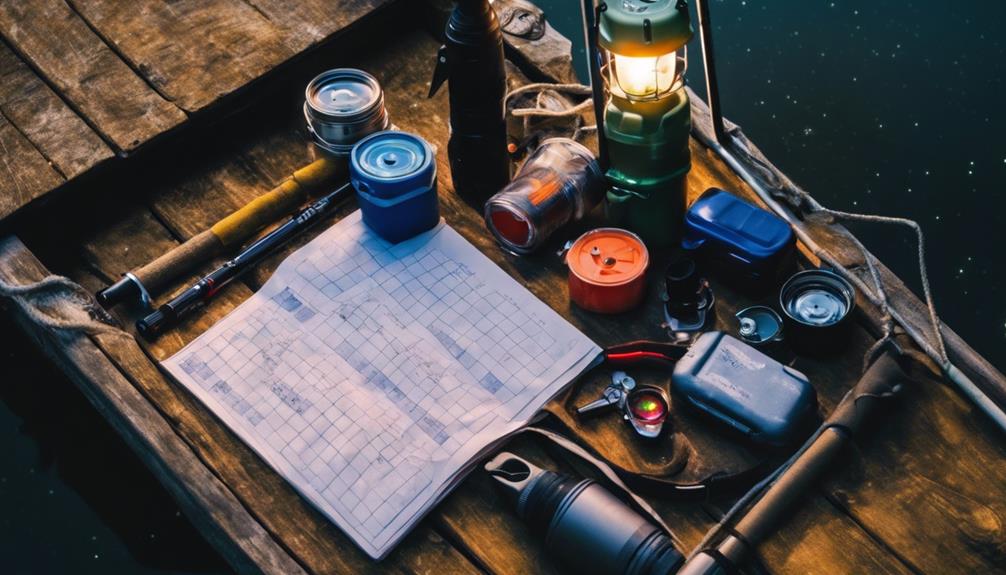In cold weather, night fishing is ideal due to increased fish activity triggered by lunar phases and lowered water temperatures, leading to heightened feeding frenzies and movement. The reduced angling pressure creates a quiet atmosphere that makes fish less threatened, allowing them to venture out more for feeding. Predators actively hunt for food during cold nights, capitalizing on the increased availability of prey. Clear waters provide better visibility for fish, especially with moonlight reflection. Specialized night gear enhances visibility and comfort, increasing chances of successful catches. Comfortable surroundings contribute to relaxation and focus, enhancing the overall fishing experience. Bigger catches and strategic advantages await in the cold depths.
Increased Fish Activity
During the colder months, fish activity tends to increase in response to changing environmental conditions. This heightened activity is influenced by various factors, including lunar phases, temperature effects, fish behavior, and metabolism. Understanding these dynamics is crucial for successful night fishing in cold weather.
Lunar phases play a significant role in fish behavior. Fish, especially species like walleye and trout, tend to be more active during certain lunar phases, such as the new moon and full moon. These phases can trigger feeding frenzies and heightened movement, making it an opportune time for anglers to target these species.
Temperature effects on fish metabolism also contribute to increased activity during colder months. As water temperature decreases, fish metabolism slows down, causing them to conserve energy. To maintain their energy levels, fish need to feed more frequently. This drive to feed leads to heightened activity, making them more susceptible to biting bait or lures.
Additionally, fish behavior changes in response to colder conditions. Some species, like bass and crappie, may move to shallower waters during colder months to find warmer temperatures. This movement increases their presence in areas where anglers can target them effectively.
Less Fishing Pressure
Experiencing reduced angling pressure can significantly impact fish behavior and increase the likelihood of successful catches in cold weather. A quiet atmosphere resulting from fewer anglers present during cold nights allows fish to feel less threatened and more at ease. Undisturbed fish are more likely to venture out of their hiding spots to feed or explore, making them more susceptible to bait and lures.
Scientific studies have shown that high fishing pressure can cause fish to become wary and less likely to bite. In contrast, when fishing pressure is low, fish exhibit more natural behaviors, making them easier to attract and catch. The absence of constant disturbances from other anglers allows fish to roam freely and explore different areas, increasing the chances of encountering them during a night fishing expedition.
Additionally, less fishing pressure means that fish populations have the opportunity to thrive without constant stress. This can lead to healthier and larger fish populations in bodies of water where angling pressure is reduced, providing anglers with the potential to catch bigger fish during their cold-weather night fishing trips.
Feeding Opportunities for Predators
Feeding opportunities for predators increase significantly in cold weather conditions, attracting a variety of predatory species to actively hunt for food sources. The drop in temperatures triggers a cascade of biological responses, influencing the behavior of nocturnal predators. These predators rely on their hunting instincts, finely tuned by evolution, to capitalize on the increased availability of prey during colder nights.
Cold weather prompts changes in the distribution and behavior of nocturnal prey species, creating a shift in nocturnal prey relations. As temperatures decrease, many prey species become more active, seeking out warmer waters or migrating to shallower areas. This movement exposes them to potential predators lurking in the shadows, ready to strike. Predators such as bass, walleye, and catfish take advantage of these movements, utilizing their acute senses and stealthy hunting tactics to secure a meal.
Furthermore, the decreased fishing pressure during winter nights allows predator populations to thrive without constant human interference. This combination of factors sets the stage for a dynamic predator-prey interaction under the cover of darkness. The cold weather not only tests the resilience of both predators and prey but also offers anglers a unique opportunity to witness the intricate dance of survival unfolding beneath the icy surface.
Fish Visibility in Clear Waters
In clear waters, the visibility of fish is crucial for understanding their behavior and interactions within the aquatic ecosystem. Fish behavior is influenced by various factors, with visibility playing a significant role in their daily activities. Clear waters allow for better light penetration, enabling fish to see their surroundings more clearly. This heightened visibility affects their feeding habits, predator avoidance strategies, and social interactions.
One important aspect of fish visibility in clear waters is the impact of moonlight reflection. During nighttime fishing in clear water conditions, the moon's glow can enhance visibility for both anglers and fish. This increased illumination can lead to changes in fish behavior, such as altered feeding patterns or movement towards shallower areas where moonlight is more pronounced.
Understanding fish behavior in relation to visibility is essential for successful night fishing in clear waters. Anglers can utilize this knowledge to predict where fish are likely to be located based on the moon's position and the resulting light reflection. By observing how fish react to moonlight and adjusting fishing strategies accordingly, anglers can increase their chances of a successful catch during night fishing expeditions in clear waters.
Utilizing Specialized Night Gear
When conducting night fishing in cold weather, the utilization of specialized gear is crucial for enhancing visibility and optimizing angling success. Two key types of specialized gear that play a significant role in night fishing are night vision devices and thermal gear.
Night vision technology amplifies ambient light to improve visibility in low-light conditions. Night vision goggles or scopes can greatly enhance your ability to see the surrounding environment, including potential obstacles and, most importantly, fish movements. By investing in quality night vision gear, anglers can spot fish more easily and accurately target their casts, increasing the likelihood of successful catches during nighttime fishing sessions.
Thermal gear is another essential component for cold weather night fishing. Clothing items such as thermal jackets, pants, and gloves help maintain body heat, ensuring anglers stay warm and comfortable throughout their fishing expeditions. Additionally, thermal gear can prevent hypothermia and allow for prolonged fishing periods in chilly conditions. Furthermore, specialized thermal blankets or sleeping bags can provide warmth during breaks or rest periods, enhancing overall comfort and safety during extended fishing trips.
Comfortable Fishing Conditions
To ensure optimal performance and focus during cold weather night fishing, maintaining comfortable fishing conditions is imperative. The first key element for comfort in this setting is warm clothing. Proper attire is essential to combat the chill of the night air and keep your body temperature stable. Layering up with moisture-wicking fabrics close to the skin, insulating layers, and a waterproof outer shell can help you stay warm and dry throughout your fishing expedition.
Another crucial factor for comfortable night fishing is finding a spot that offers quiet solitude. Being surrounded by peaceful and serene surroundings can enhance your overall experience by reducing distractions and allowing you to fully immerse yourself in the fishing process. Selecting a secluded location away from noisy crowds or disruptive sounds can create a tranquil environment conducive to concentration and relaxation.
Enhanced Sensory Experience

For a heightened sensory experience while night fishing in cold weather, focus on maximizing your awareness of subtle cues and stimuli in your surroundings. The combination of the crisp air, the quiet of the night, and the unique sounds and smells that come with the cold can create an environment rich in sensory stimulation. By honing your senses, you can significantly enhance your fishing experience.
When fishing in cold weather at night, your heightened awareness can be a powerful tool. Pay close attention to the subtle movements in the water, the rustling of nearby wildlife, and the feel of the wind on your skin. These sensory cues can provide valuable information about potential fish activity and help you anticipate bites more effectively.
Furthermore, the cold temperatures can sharpen your senses, making you more attuned to even the smallest changes in your environment. The sound of a fish breaking the surface, the tug on your line, or the faint glow of bioluminescent organisms in the water can all be more pronounced in the cold, adding to the sensory experience of night fishing.
Potential for Bigger Catches
In cold weather conditions, the potential for landing bigger catches increases due to the physiological changes fish undergo to adapt to the lower temperatures. As the water cools down, fish metabolism slows, leading to a decrease in their overall activity levels. This reduction in activity means that larger, more energy-rich prey becomes a more attractive option for fish looking to conserve energy while maximizing their nutrient intake. Consequently, by presenting larger bait or lures during cold weather night fishing sessions, you can significantly increase your chances of hooking into bigger fish.
Moreover, the strategic advantage of fishing at night in cold weather can't be overstated. The darkness provides cover for predatory fish to move closer to the shallows, where they can ambush unsuspecting prey. By adopting a stealthy approach and using the moonlit excitement to your advantage, you can capitalize on the heightened predatory instincts of fish during the nighttime hours. Additionally, employing a patient nighttime strategy is crucial, as fish may take longer to investigate and strike at your bait in the colder temperatures. Remember, when it comes to night fishing in cold weather, patience pays off in the form of potentially larger and more rewarding catches.
Frequently Asked Questions
Can Fish See Better at Night Than During the Day?
Yes, fish have excellent nocturnal vision, allowing them to see better at night than during the day. Their eyes are adapted to low light conditions, making them more sensitive to movement and prey in the dark.
Nocturnal feeding habits are also supported by their heightened senses, such as their ability to detect vibrations in the water. These adaptations contribute to their ability to navigate and hunt effectively in the darkness.
How Does Cold Weather Affect Fish Feeding Behavior?
In cold weather, temperature impact influences fish feeding patterns significantly. As temperatures drop, fish metabolism slows down, leading to decreased activity levels and reduced feeding. This change in behavior can make fish less likely to actively search for food, resulting in fewer bites for anglers.
Understanding how cold weather affects fish feeding behavior is crucial for adjusting your fishing strategies to improve your chances of a successful catch.
What Specialized Gear Is Essential for Night Fishing?
When it comes to night fishing, having the right gear is crucial. Advantages of night fishing include reduced competition, cooler temperatures, and potentially more active fish.
Essential gear recommendations for night fishing include headlamps for visibility, high-visibility fishing lines, bite alarms to detect activity, and thermos bottles to keep warm. Proper clothing, such as layered garments and waterproof gear, can also enhance your night fishing experience.
Do Predators Hunt More Aggressively in Cold Weather?
In cold weather, predators tend to hunt more aggressively due to changes in prey behavior and hunting patterns. The drop in temperature can impact predator activity, leading them to be more active and alert in seeking out food sources.
This heightened aggression is driven by the need to secure sustenance when prey may be more vulnerable or less abundant during colder conditions. The interplay between temperature and predator-prey dynamics influences hunting strategies in cold weather.
Is Night Fishing in Cold Weather Safe for Anglers?
When considering night fishing in cold weather, safety precautions are crucial.
Ensure you have proper gear like insulated clothing and a reliable light source.
Be aware of temperature regulation to prevent hypothermia.
Stay dry and avoid prolonged exposure to the cold.
Always inform someone of your fishing plans and location.
Conclusion
In conclusion, cold weather provides ideal conditions for night fishing due to increased fish activity, less fishing pressure, feeding opportunities for predators, improved fish visibility, and the use of specialized night gear.
These factors contribute to comfortable fishing conditions and an enhanced sensory experience, ultimately leading to the potential for bigger catches.
By taking advantage of these conditions, anglers can maximize their chances of success during cold weather night fishing excursions.



